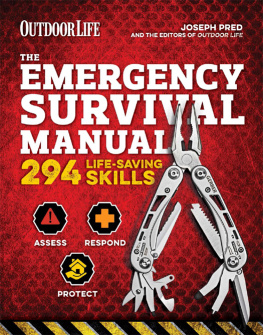Introduction
Why I wrote this book
After spending most of my life working for other people, I decided I needed to escape. The year was 2016, and the company I was a CTO and General Manager for was laying off around half the company. In many ways, we had achieved wild success going from zero in revenue to millions from two product lines: merchandise and influencer marketing. We also at one point in talks with most of the significant sports personalities on earth and had millions of users each month that visited our site.
Startups are risky, though, and we made a massive bet to partner with a major soccer club. It was an all-in bet, and it didnt work. I put every last ounce energy into making this company money, hiring employees, and building the software, and it was on fire. It was at that point that I decided to quit. I had a good run working from major brands my entire life: Disney, Sony, AT&T, and more. I wanted autonomy. I needed to escape the corporate grind.
At the peak of the craziness, I had been working 100 hour weeks straight to get the company to continue the hyper-growth, and I was running on fumes. My family and I decided to take a one week vacation to Maui. My boss that Friday came into my office and told me I couldnt take a week off. The investors felt I was too valuable to get a vacation.
To say I was upset was an understatement. I was so angry that it took several days for the anger to surface. My family went on the trip without me, and I slowly turned into a raging river of molten lava. It culminated in me telling my boss I was going anyway and I didnt care what happened. I hopped on a plane, turned off my cellphone, and joined the family on their trip. Ultimately the job was still there when I got back, which wasnt a big surprise.
This showdown set the seed for my escape. The layoff and implosion of the company was the final straw. I had to escape the corporate prison of high wages that restricted my freedom. No matter how much money I made, my life was not truly free. Even running a company didnt make me free. I kept thinking about the movie Shawshank Redemption. The main character, played by Tim Robbins, was falsely imprisoned and spent years plotting his escape. I knew I could do flee as well, but it would require a strategy.
Your boss doesnt want you to read this book
The number one reason people leave a job is that they have a terrible boss. When you work for someone else, you are ultimately subservient to another human being, or in a pathological case, many bosses. Just like the movie Shawshank Redemption, it institutionalizes you. You start to say what the boss wants you to say. You begin to think about what the boss wants you to believe. The way to escape corporate life is to stop pleasing your boss.
Only in sporadic cases does a boss have your best interests in mind. It isnt necessarily their fault, but corporate America creates subservience. Our educational system also rewards this by giving grades for compliance. An A grade is often a proxy for obedience. As you enter the workforce, what makes you successful is doing what you are told to do. Eventually, you get atobeying.
What is the alternative? If you want to escape corporate America and optimize your life for autonomy, the first step is to consider yourself. An excellent first step is to create a plan to learn skills that will help you earn revenue that will give you the freedom to make more significant moves. When are you going to get the time to do this?
You can do it at work. Almost all jobs, even startups, are full of waste. You can efficiently work six hours a day and spend two hours a day training yourself on skills that your company doesnt approve of your learning. This process is very similar to going to bed in prison at night and secretly digging a tunnel behind a poster. Learning on the job is like the Google 20% time, but it is for you. Make your own 20% time, and dont ask for permission.
Learn to develop side-hustle while fully employed. It is one of the best complementary strategies to escape. This process serves many purposes. First, you can practice what you learn in your 20% time. Second, it provides income, which you want to put into an index fund and not touch. Third, it provides a network, and maybe this side-hustle client becomes one of the pillars of your consulting company. Fourth it serves as proof to future clients that you solve a problem for them.
It is a cliche now for a startup executive to talk about how the company is a rocket-ship. Also that it is on the path to a billion-dollar company. 95% of startups fail, so 95/100 times, this executive is spouting bullshit. Often 12 months later, 25% of the company is quietly laid off.

rocket-ship
Doing what your boss tells you and blindly following it is perhaps the worst career move you can make. Be thoughtful about what leaders say, and be careful to always consider your quality of life first before jumping into a 100-hour workweek. The day you are laid off, you can count on the boss, forgetting your name in most scenarios. Instead, bet on yourself. You cannot afford any other bet.
Why do I know about this scenario, because I have been on every side of this? Sometimes I have been the stupid boss who told people to work 100 hour weeks to build a billion-dollar company, sometimes I was told it. In all cases, betting everything on a company is a risky strategy, and it doesnt always pay off.
Another way to put this scenario is the following:
Option A: Work 100 hours for a startup
If you work for ten startups in your lifetime, you would have failed at least nine times. Success, if achieved, is what? Is it a 100K equity grant? Is it worth a 1 million equity grant? What are the nine failures at 100 hours a week worth?
Option B: Work 40 hours for a startup (or another company) and invest 60 hours on yourself
Are you, as a person, worth the investment? If you cannot bet on yourself, then why would anyone else? What if you did your job, but spent the other 60 hours doing the following:
- Getting 8 hours sleep
- Eating healthy food
- Being physically and mentally fit through daily exercise
- Learning skills
- Making real money on side-gigs, consulting and investing
In option B, your odds of success are 100%. You are in control of the outcome. Either you work to make extra money and invest it, or you dont. In option A success in the hands of others. If you picked the right company at the odds of roughly 5/100, it might just work. Hope is not a strategy.
Dont leave success in the hands of others
















 rocket-ship
rocket-ship